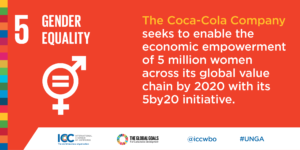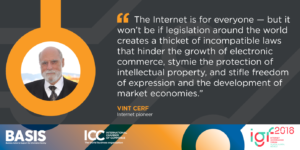ICC, UN & partners
3 ways business is promoting human rights
As stakeholders from around the world prepare for the 2017 UN Forum on Business and Human Rights, here are three areas in which business is already making a difference.
On 27-29 November 2017, over 2,000 participants representing governments, businesses, community groups, NGOs, trade unions, academia and the media will meet in Geneva, Switzerland for the 2017 United Nations (UN) Forum on Business and Human Rights. Founded in 2011 alongside the publication of the UN’s landmark Guiding Principles on Business and Human Rights, the UN Forum provides a global platform to take stock of progress made in moving towards the UN Guidelines and discuss major human rights issues in the global economy.
As the world’s largest and most representative business organisation, with a network of over six million members in more than 100 countries, ICC has a broad view of how business and human rights intersect. Moreover, as the only private sector organisation that is an Observer to the UN, ICC has a key role to play in engaging business’ commitment to human rights and the UN sustainable development goals within the UN’s international decision-making system. At the Forum, companies from around the world will be showing how they are providing access to remedy through multi-stakeholder engagement and other means.
Establishing clear common guidelines for how companies can play their part in promoting human rights has already “spurred action by many businesses”, the UN notes. The development of the 2017 Corporate Human Rights Benchmark—an initiative that assesses and ranks 98 of the largest publicly-traded companies according to human rights indicators—also provides a powerful incentive for companies to showcase their corporate human rights records. At the Business and Human Rights Forum, ICC will be co-organising a business briefing and networking event on the first day.
As we approach the November Forum, here are three areas in which business is already making a difference:
- Advancing gender equality
Ensuring that women are afforded equal opportunities and pay in the workplace makes solid business sense. According to estimates by the International Monetary Fund, the underutilisation of the female labour force results in losses of up to 27% of GDP in some world regions. While government policies can be helpful in addressing persistent gender gaps in economic participation and pay, the private sector has already stepped up to combat such structural inequalities.
Coca-Cola’s 5by20 initiative aims to develop 5 million women entrepreneurs by 2020, enabling the economic empowerment of women across the company’s global value chain by working with local NGOs, government and companies in countries such as Brazil, South Africa, Kenya, Haiti and Egypt. In India, Tata Steel has created a “Women Empowerment Cell” comprising members of management and junior staff charged with organising needs-based training for female employees with the aim of maximising their potential within the company.

In accordance with its role as a global standard-setter, ICC promotes pragmatic guidelines for gender equality like the UN’s Women’s Empowerment Principles. At the Forum on Business and Human Rights, ICC is calling for policies that recognise the importance of gender diversity, due diligence on gender discrimination and performance targets with gender-disaggregated data.
- Promoting rights online
ICC strongly promotes the principle that the rights people have offline must also be protected online. Freedom of expression and free flow of information is paramount to the success of a knowledgeable and economically-viable Internet society, so any limitations to these rights should only be for legitimate public policy objectives, such as protecting the rights of others and the rule of law consistent with international treaties.
Data flows play a central role both in fuelling the digital economy and enabling online freedom of expression to be fully realised. To that end, business takes seriously the need to put in practice effective and accountable privacy and security measures while working with governments to design appropriate policies to meet these common goals.

- Responding for refugees
Few members of society are more vulnerable today than refugees and migrants, many of whom have been victims of discrimination, exclusion and racism. Private sector companies have often been vocal in challenging negative narratives around migrants and have a key role to play in helping the newly arrived men, women and children integrate into economies and societies. Last April, ICC announced the development of a new partnership with the UN Refugee Agency to enhance business engagement in the international response to the global refugee crisis and has a strong record in defending the essential role that migration plays in creating jobs and economic growth around the world.
On the company level, Maple Leaf Foods—a Canadian food processing company faced with a labour shortage in the sparsely populated province of Manitoba—worked with the International Organisation for Migration to facilitate the fair, transparent and safe migration of temporary foreign workers to Canada. Manpower conducts language programmes in almost every country it operates in—helping refugees in Thailand that have been accepted for settlement in the United States to learn English-language skills, for instance.
Further case studies of how business is productively engaging in the promotion of human rights can be found in the Human Rights and Business Dilemmas Forum.
